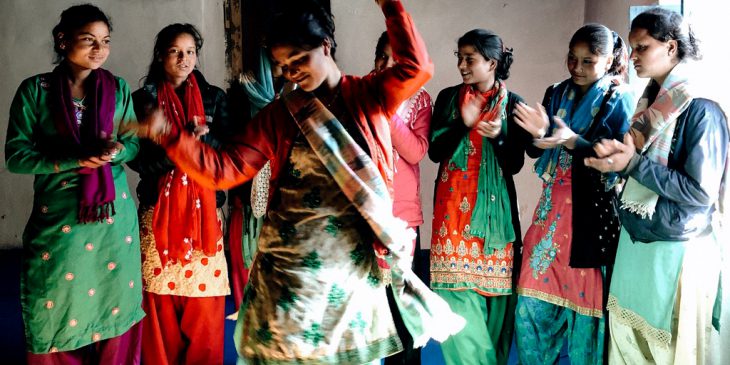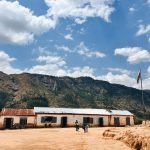After two hours wading through knee-deep snow blanketing a steep mountain trail on a January morning in far west Nepal, Sara Baumann momentarily considered that she might have gotten herself in too deep.
“We couldn’t see anything, and the roads were treacherous with no guard rails. When we finally got to our Jeep, we couldn’t drive it anywhere so we wound up having to hike on to the next village,” said Baumann, M.P.H., a doctoral candidate and researcher at the University of Pittsburgh Graduate School of Public Health. “But, that meant four more days fully immersed in this culture that I had come halfway around the world to experience. I can’t be negative about that.”
Baumann, who will conclude her Ph.D. studies at Pitt Public Health’s Department of Behavioral and Community Health Sciences this summer, spent the past nine months in Nepal, in part conducting qualitative research and data collection on chhaupadi, an illegal cultural tradition that isolates menstruating women – who are considered “unclean” – to huts, basements or livestock sheds.
The practice, which has been linked to multiple deaths, was banned in the South Asian country in 2005, and criminal codes were enacted in 2017 to enforce the ban.
Baumann has long researched the practice, most recently with a study published in the journal Global Public Health that assessed the role of caste (a cultural and social class system) or ethnicity, or both, as the terms are sometimes used interchangeably, in menstrual knowledge, attitudes and practices in Nepal. That study found that caste/ethnicity is a strong predictor of menstrual knowledge and practices among Nepali women and girls.
Her recent research trip was supported by a Boren Fellowship, an initiative of the National Security Education Program to immerse graduate students in the culture and language of countries underrepresented in study abroad. In addition to intensive language instruction, Baumann launched a study collecting data in the form of in-depth interviews and focus group discussions with dozens of Nepalis about their knowledge on chhaupadi laws and their views on enforcement.
“I expected people to be hesitant to talk with me about chhaupadi now that it is criminalized with fines and jail time. But in most cases, they didn’t even know about the new criminalization code and were very curious to hear about it. It was in the discussions that unfolded as a part of this research that many heard about the new policy for the first time,” said Baumann. “Once we started talking, I was surprised with how open they were, and how positive and thoughtful they were in their responses.”
Baumann explained that the Nepalis she interviewed were generally supportive of criminal penalties for violating the laws regarding chhaupadi, but a recurrent theme was that enforcement needs to be uniform across the country and authority should be delegated to the community police. She recently shared preliminary findings at the Biennial Conference for the Society of Menstrual Cycle Research.
While in Nepal, Baumann also participated in a panel at the Kathmandu International Mountain Film Festival, where a collaborative filmmaking project she created with her doctoral advisor, Jessica Griffin Burke, Ph.D., and the Nepal Fertility Care Center was featured. In 2017, the team gave video cameras to Nepali girls ages 16 to 18 and tasked them with creating films depicting the traditional menstrual practices in their families.
“What collaborative filmmaking does is bring the experience of people in completely different cultures alive,” said Burke, professor and associate chair of Pitt Public Health’s Department of Community and Behavioral Health Sciences. “When you place the camera in the hands of the participants, it brings us, the viewers, there with them, allowing us to share their experience.”
Baumann explained that the film festival in Kathmandu was the first time any of the participating girls had ever left their villages. During the panel, which was focused on the power of visuals and media to communicate the menstruation-related experiences of women and girls throughout the country, the moderator invited the girls to speak and one of them came forward.
“She explained how the process of collaborative filmmaking impacted not only her life, but the lives of other girls in her village. They gained the confidence to talk about menstruation and many other issues in their community and what they can do to create change,” said Baumann, who also presented the work at the International Visual Sociology Association Conference. “It really highlighted the unintended, trickle-down benefits of empowering people to share their stories.”










